Introduction to Forensic Psychology: Eyewitness Identification Report
VerifiedAdded on 2021/01/01
|8
|2235
|334
Report
AI Summary
This report delves into the realm of forensic psychology, specifically focusing on the reliability of eyewitness identification within the legal system. It examines the core principles of forensic psychology and its application to criminal investigations, highlighting the importance of eyewitness testimony in determining the truth. The report identifies and analyzes key psychological factors that can influence the accuracy of eyewitness accounts, including stress, weapon focus, and distraction. It explores how these factors impact memory and potentially lead to misidentification. Furthermore, the report discusses the legal implications of eyewitness analysis, emphasizing the role of forensic psychologists in providing expert testimony and clarifying the validity of witness statements in court. The conclusion reinforces the significance of forensic psychology in ensuring justice, particularly through the careful evaluation of eyewitness evidence and its influence on legal decisions.
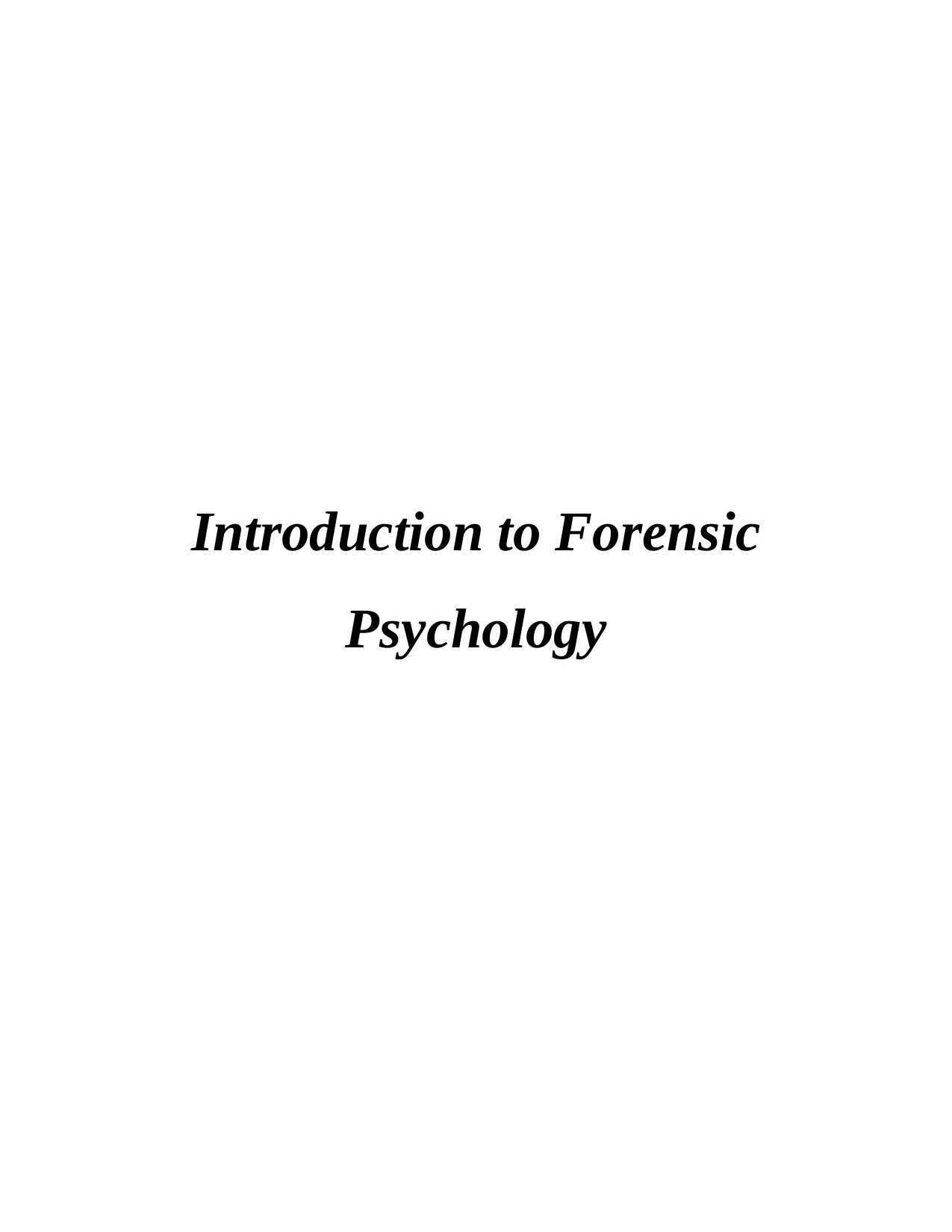
Introduction to Forensic
Psychology
Psychology
Paraphrase This Document
Need a fresh take? Get an instant paraphrase of this document with our AI Paraphraser
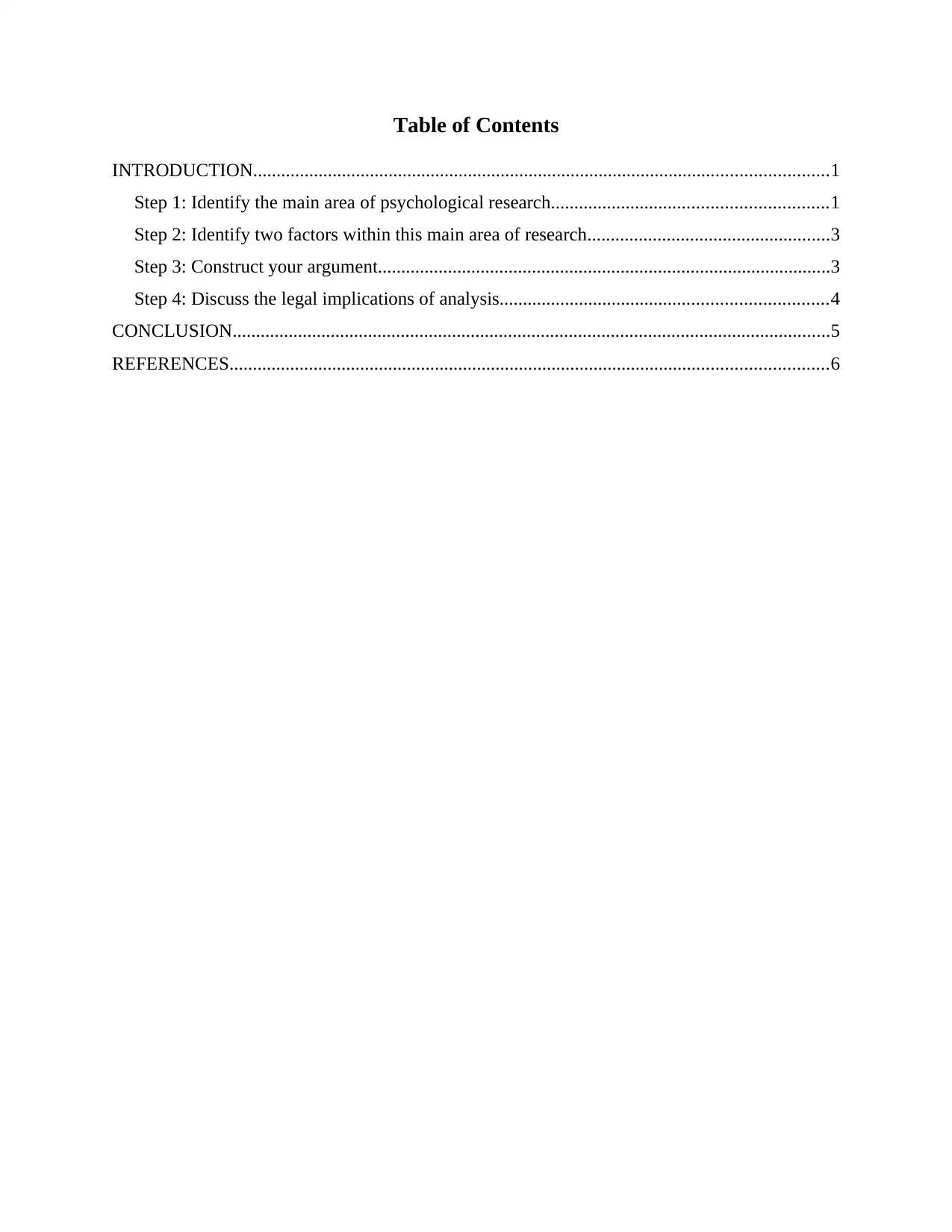
Table of Contents
INTRODUCTION...........................................................................................................................1
Step 1: Identify the main area of psychological research...........................................................1
Step 2: Identify two factors within this main area of research....................................................3
Step 3: Construct your argument.................................................................................................3
Step 4: Discuss the legal implications of analysis......................................................................4
CONCLUSION................................................................................................................................5
REFERENCES................................................................................................................................6
INTRODUCTION...........................................................................................................................1
Step 1: Identify the main area of psychological research...........................................................1
Step 2: Identify two factors within this main area of research....................................................3
Step 3: Construct your argument.................................................................................................3
Step 4: Discuss the legal implications of analysis......................................................................4
CONCLUSION................................................................................................................................5
REFERENCES................................................................................................................................6
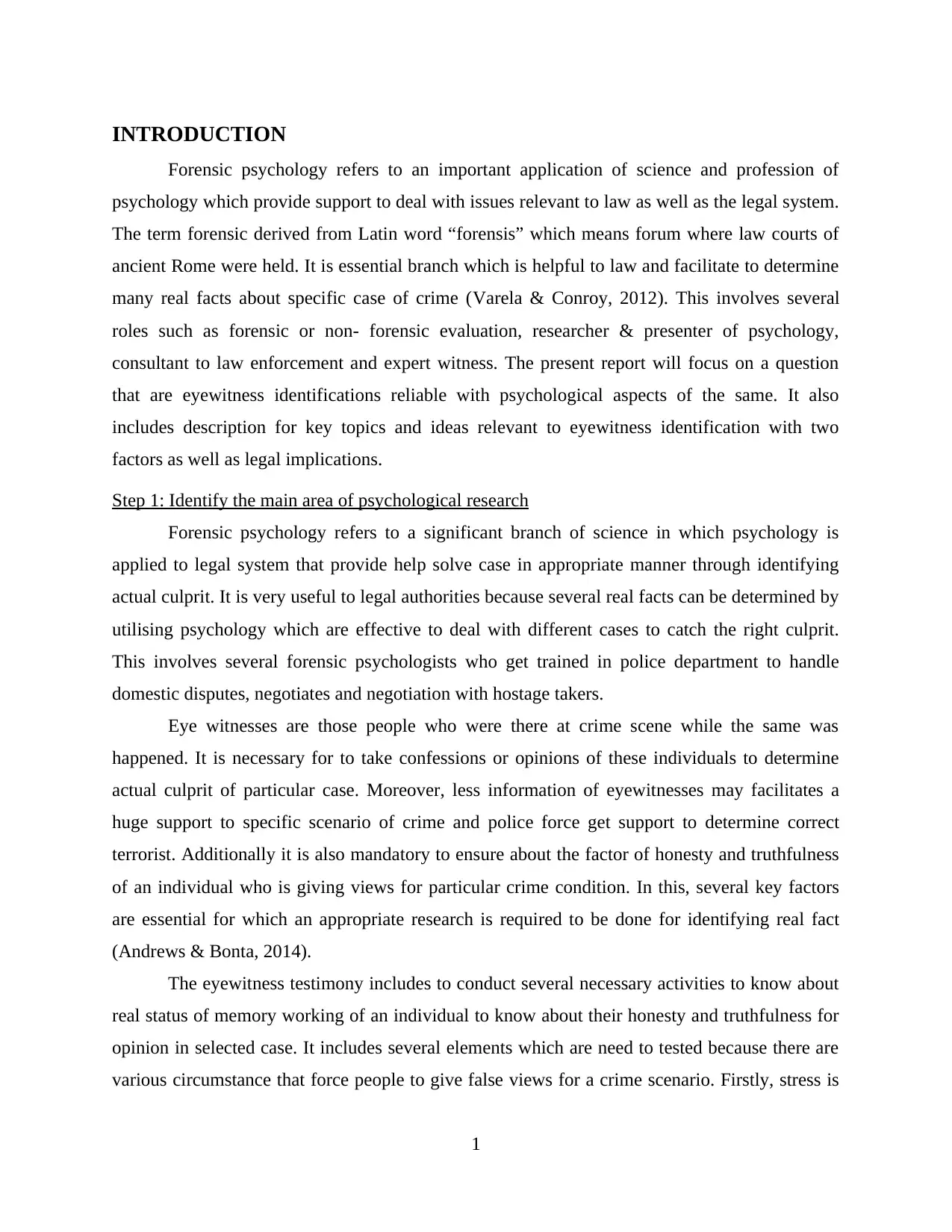
INTRODUCTION
Forensic psychology refers to an important application of science and profession of
psychology which provide support to deal with issues relevant to law as well as the legal system.
The term forensic derived from Latin word “forensis” which means forum where law courts of
ancient Rome were held. It is essential branch which is helpful to law and facilitate to determine
many real facts about specific case of crime (Varela & Conroy, 2012). This involves several
roles such as forensic or non- forensic evaluation, researcher & presenter of psychology,
consultant to law enforcement and expert witness. The present report will focus on a question
that are eyewitness identifications reliable with psychological aspects of the same. It also
includes description for key topics and ideas relevant to eyewitness identification with two
factors as well as legal implications.
Step 1: Identify the main area of psychological research
Forensic psychology refers to a significant branch of science in which psychology is
applied to legal system that provide help solve case in appropriate manner through identifying
actual culprit. It is very useful to legal authorities because several real facts can be determined by
utilising psychology which are effective to deal with different cases to catch the right culprit.
This involves several forensic psychologists who get trained in police department to handle
domestic disputes, negotiates and negotiation with hostage takers.
Eye witnesses are those people who were there at crime scene while the same was
happened. It is necessary for to take confessions or opinions of these individuals to determine
actual culprit of particular case. Moreover, less information of eyewitnesses may facilitates a
huge support to specific scenario of crime and police force get support to determine correct
terrorist. Additionally it is also mandatory to ensure about the factor of honesty and truthfulness
of an individual who is giving views for particular crime condition. In this, several key factors
are essential for which an appropriate research is required to be done for identifying real fact
(Andrews & Bonta, 2014).
The eyewitness testimony includes to conduct several necessary activities to know about
real status of memory working of an individual to know about their honesty and truthfulness for
opinion in selected case. It includes several elements which are need to tested because there are
various circumstance that force people to give false views for a crime scenario. Firstly, stress is
1
Forensic psychology refers to an important application of science and profession of
psychology which provide support to deal with issues relevant to law as well as the legal system.
The term forensic derived from Latin word “forensis” which means forum where law courts of
ancient Rome were held. It is essential branch which is helpful to law and facilitate to determine
many real facts about specific case of crime (Varela & Conroy, 2012). This involves several
roles such as forensic or non- forensic evaluation, researcher & presenter of psychology,
consultant to law enforcement and expert witness. The present report will focus on a question
that are eyewitness identifications reliable with psychological aspects of the same. It also
includes description for key topics and ideas relevant to eyewitness identification with two
factors as well as legal implications.
Step 1: Identify the main area of psychological research
Forensic psychology refers to a significant branch of science in which psychology is
applied to legal system that provide help solve case in appropriate manner through identifying
actual culprit. It is very useful to legal authorities because several real facts can be determined by
utilising psychology which are effective to deal with different cases to catch the right culprit.
This involves several forensic psychologists who get trained in police department to handle
domestic disputes, negotiates and negotiation with hostage takers.
Eye witnesses are those people who were there at crime scene while the same was
happened. It is necessary for to take confessions or opinions of these individuals to determine
actual culprit of particular case. Moreover, less information of eyewitnesses may facilitates a
huge support to specific scenario of crime and police force get support to determine correct
terrorist. Additionally it is also mandatory to ensure about the factor of honesty and truthfulness
of an individual who is giving views for particular crime condition. In this, several key factors
are essential for which an appropriate research is required to be done for identifying real fact
(Andrews & Bonta, 2014).
The eyewitness testimony includes to conduct several necessary activities to know about
real status of memory working of an individual to know about their honesty and truthfulness for
opinion in selected case. It includes several elements which are need to tested because there are
various circumstance that force people to give false views for a crime scenario. Firstly, stress is
1
⊘ This is a preview!⊘
Do you want full access?
Subscribe today to unlock all pages.

Trusted by 1+ million students worldwide
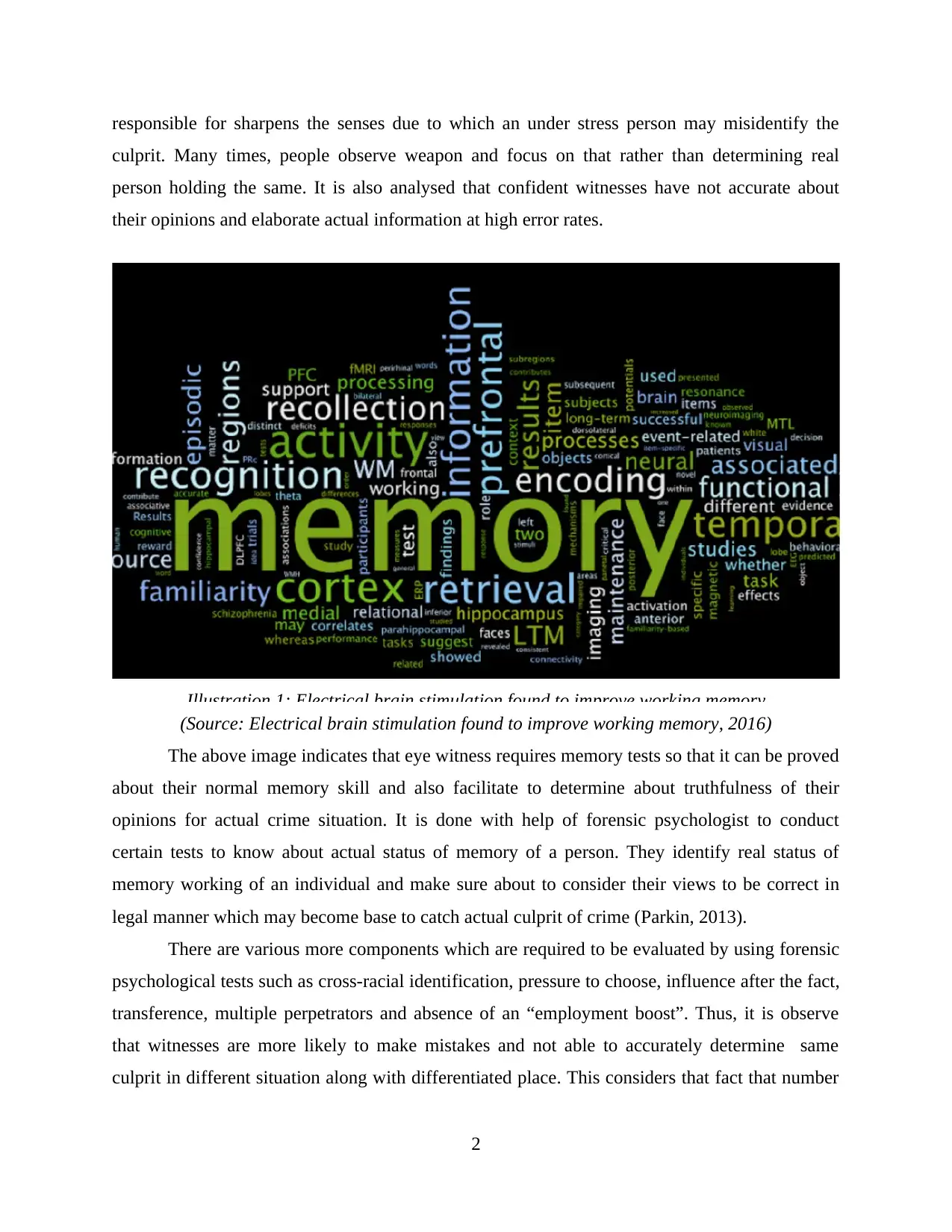
responsible for sharpens the senses due to which an under stress person may misidentify the
culprit. Many times, people observe weapon and focus on that rather than determining real
person holding the same. It is also analysed that confident witnesses have not accurate about
their opinions and elaborate actual information at high error rates.
(Source: Electrical brain stimulation found to improve working memory, 2016)
The above image indicates that eye witness requires memory tests so that it can be proved
about their normal memory skill and also facilitate to determine about truthfulness of their
opinions for actual crime situation. It is done with help of forensic psychologist to conduct
certain tests to know about actual status of memory of a person. They identify real status of
memory working of an individual and make sure about to consider their views to be correct in
legal manner which may become base to catch actual culprit of crime (Parkin, 2013).
There are various more components which are required to be evaluated by using forensic
psychological tests such as cross-racial identification, pressure to choose, influence after the fact,
transference, multiple perpetrators and absence of an “employment boost”. Thus, it is observe
that witnesses are more likely to make mistakes and not able to accurately determine same
culprit in different situation along with differentiated place. This considers that fact that number
2
Illustration 1: Electrical brain stimulation found to improve working memory
culprit. Many times, people observe weapon and focus on that rather than determining real
person holding the same. It is also analysed that confident witnesses have not accurate about
their opinions and elaborate actual information at high error rates.
(Source: Electrical brain stimulation found to improve working memory, 2016)
The above image indicates that eye witness requires memory tests so that it can be proved
about their normal memory skill and also facilitate to determine about truthfulness of their
opinions for actual crime situation. It is done with help of forensic psychologist to conduct
certain tests to know about actual status of memory of a person. They identify real status of
memory working of an individual and make sure about to consider their views to be correct in
legal manner which may become base to catch actual culprit of crime (Parkin, 2013).
There are various more components which are required to be evaluated by using forensic
psychological tests such as cross-racial identification, pressure to choose, influence after the fact,
transference, multiple perpetrators and absence of an “employment boost”. Thus, it is observe
that witnesses are more likely to make mistakes and not able to accurately determine same
culprit in different situation along with differentiated place. This considers that fact that number
2
Illustration 1: Electrical brain stimulation found to improve working memory
Paraphrase This Document
Need a fresh take? Get an instant paraphrase of this document with our AI Paraphraser
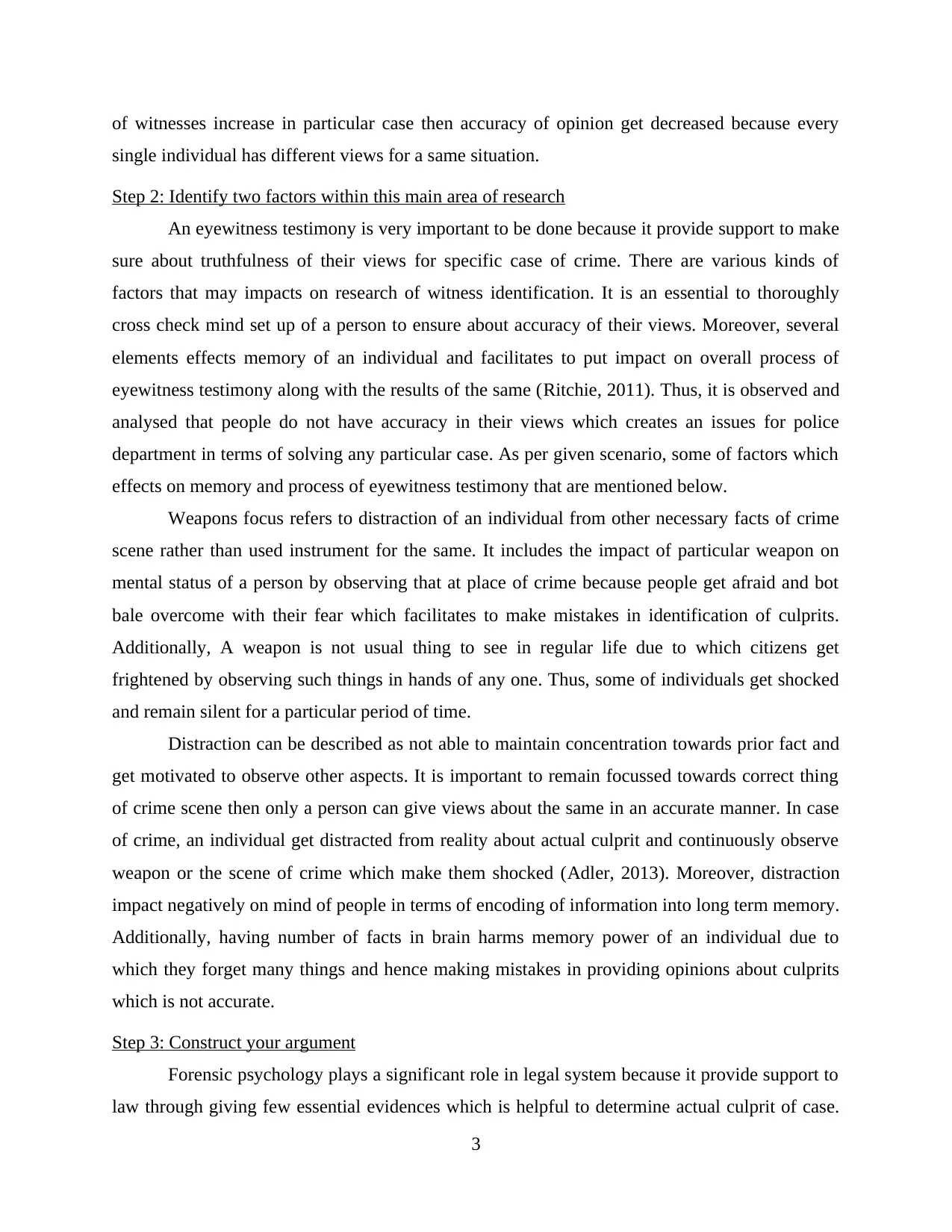
of witnesses increase in particular case then accuracy of opinion get decreased because every
single individual has different views for a same situation.
Step 2: Identify two factors within this main area of research
An eyewitness testimony is very important to be done because it provide support to make
sure about truthfulness of their views for specific case of crime. There are various kinds of
factors that may impacts on research of witness identification. It is an essential to thoroughly
cross check mind set up of a person to ensure about accuracy of their views. Moreover, several
elements effects memory of an individual and facilitates to put impact on overall process of
eyewitness testimony along with the results of the same (Ritchie, 2011). Thus, it is observed and
analysed that people do not have accuracy in their views which creates an issues for police
department in terms of solving any particular case. As per given scenario, some of factors which
effects on memory and process of eyewitness testimony that are mentioned below.
Weapons focus refers to distraction of an individual from other necessary facts of crime
scene rather than used instrument for the same. It includes the impact of particular weapon on
mental status of a person by observing that at place of crime because people get afraid and bot
bale overcome with their fear which facilitates to make mistakes in identification of culprits.
Additionally, A weapon is not usual thing to see in regular life due to which citizens get
frightened by observing such things in hands of any one. Thus, some of individuals get shocked
and remain silent for a particular period of time.
Distraction can be described as not able to maintain concentration towards prior fact and
get motivated to observe other aspects. It is important to remain focussed towards correct thing
of crime scene then only a person can give views about the same in an accurate manner. In case
of crime, an individual get distracted from reality about actual culprit and continuously observe
weapon or the scene of crime which make them shocked (Adler, 2013). Moreover, distraction
impact negatively on mind of people in terms of encoding of information into long term memory.
Additionally, having number of facts in brain harms memory power of an individual due to
which they forget many things and hence making mistakes in providing opinions about culprits
which is not accurate.
Step 3: Construct your argument
Forensic psychology plays a significant role in legal system because it provide support to
law through giving few essential evidences which is helpful to determine actual culprit of case.
3
single individual has different views for a same situation.
Step 2: Identify two factors within this main area of research
An eyewitness testimony is very important to be done because it provide support to make
sure about truthfulness of their views for specific case of crime. There are various kinds of
factors that may impacts on research of witness identification. It is an essential to thoroughly
cross check mind set up of a person to ensure about accuracy of their views. Moreover, several
elements effects memory of an individual and facilitates to put impact on overall process of
eyewitness testimony along with the results of the same (Ritchie, 2011). Thus, it is observed and
analysed that people do not have accuracy in their views which creates an issues for police
department in terms of solving any particular case. As per given scenario, some of factors which
effects on memory and process of eyewitness testimony that are mentioned below.
Weapons focus refers to distraction of an individual from other necessary facts of crime
scene rather than used instrument for the same. It includes the impact of particular weapon on
mental status of a person by observing that at place of crime because people get afraid and bot
bale overcome with their fear which facilitates to make mistakes in identification of culprits.
Additionally, A weapon is not usual thing to see in regular life due to which citizens get
frightened by observing such things in hands of any one. Thus, some of individuals get shocked
and remain silent for a particular period of time.
Distraction can be described as not able to maintain concentration towards prior fact and
get motivated to observe other aspects. It is important to remain focussed towards correct thing
of crime scene then only a person can give views about the same in an accurate manner. In case
of crime, an individual get distracted from reality about actual culprit and continuously observe
weapon or the scene of crime which make them shocked (Adler, 2013). Moreover, distraction
impact negatively on mind of people in terms of encoding of information into long term memory.
Additionally, having number of facts in brain harms memory power of an individual due to
which they forget many things and hence making mistakes in providing opinions about culprits
which is not accurate.
Step 3: Construct your argument
Forensic psychology plays a significant role in legal system because it provide support to
law through giving few essential evidences which is helpful to determine actual culprit of case.
3
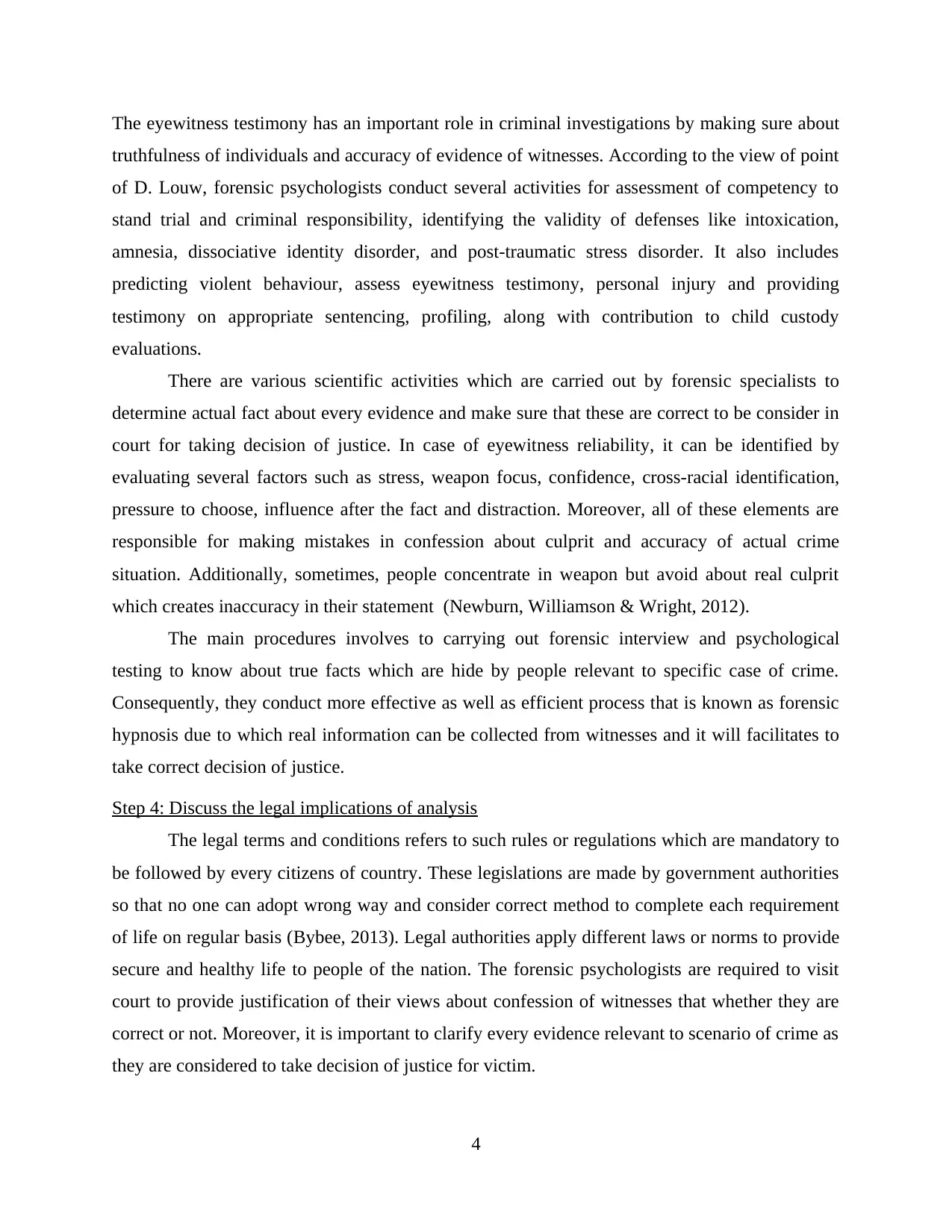
The eyewitness testimony has an important role in criminal investigations by making sure about
truthfulness of individuals and accuracy of evidence of witnesses. According to the view of point
of D. Louw, forensic psychologists conduct several activities for assessment of competency to
stand trial and criminal responsibility, identifying the validity of defenses like intoxication,
amnesia, dissociative identity disorder, and post-traumatic stress disorder. It also includes
predicting violent behaviour, assess eyewitness testimony, personal injury and providing
testimony on appropriate sentencing, profiling, along with contribution to child custody
evaluations.
There are various scientific activities which are carried out by forensic specialists to
determine actual fact about every evidence and make sure that these are correct to be consider in
court for taking decision of justice. In case of eyewitness reliability, it can be identified by
evaluating several factors such as stress, weapon focus, confidence, cross-racial identification,
pressure to choose, influence after the fact and distraction. Moreover, all of these elements are
responsible for making mistakes in confession about culprit and accuracy of actual crime
situation. Additionally, sometimes, people concentrate in weapon but avoid about real culprit
which creates inaccuracy in their statement (Newburn, Williamson & Wright, 2012).
The main procedures involves to carrying out forensic interview and psychological
testing to know about true facts which are hide by people relevant to specific case of crime.
Consequently, they conduct more effective as well as efficient process that is known as forensic
hypnosis due to which real information can be collected from witnesses and it will facilitates to
take correct decision of justice.
Step 4: Discuss the legal implications of analysis
The legal terms and conditions refers to such rules or regulations which are mandatory to
be followed by every citizens of country. These legislations are made by government authorities
so that no one can adopt wrong way and consider correct method to complete each requirement
of life on regular basis (Bybee, 2013). Legal authorities apply different laws or norms to provide
secure and healthy life to people of the nation. The forensic psychologists are required to visit
court to provide justification of their views about confession of witnesses that whether they are
correct or not. Moreover, it is important to clarify every evidence relevant to scenario of crime as
they are considered to take decision of justice for victim.
4
truthfulness of individuals and accuracy of evidence of witnesses. According to the view of point
of D. Louw, forensic psychologists conduct several activities for assessment of competency to
stand trial and criminal responsibility, identifying the validity of defenses like intoxication,
amnesia, dissociative identity disorder, and post-traumatic stress disorder. It also includes
predicting violent behaviour, assess eyewitness testimony, personal injury and providing
testimony on appropriate sentencing, profiling, along with contribution to child custody
evaluations.
There are various scientific activities which are carried out by forensic specialists to
determine actual fact about every evidence and make sure that these are correct to be consider in
court for taking decision of justice. In case of eyewitness reliability, it can be identified by
evaluating several factors such as stress, weapon focus, confidence, cross-racial identification,
pressure to choose, influence after the fact and distraction. Moreover, all of these elements are
responsible for making mistakes in confession about culprit and accuracy of actual crime
situation. Additionally, sometimes, people concentrate in weapon but avoid about real culprit
which creates inaccuracy in their statement (Newburn, Williamson & Wright, 2012).
The main procedures involves to carrying out forensic interview and psychological
testing to know about true facts which are hide by people relevant to specific case of crime.
Consequently, they conduct more effective as well as efficient process that is known as forensic
hypnosis due to which real information can be collected from witnesses and it will facilitates to
take correct decision of justice.
Step 4: Discuss the legal implications of analysis
The legal terms and conditions refers to such rules or regulations which are mandatory to
be followed by every citizens of country. These legislations are made by government authorities
so that no one can adopt wrong way and consider correct method to complete each requirement
of life on regular basis (Bybee, 2013). Legal authorities apply different laws or norms to provide
secure and healthy life to people of the nation. The forensic psychologists are required to visit
court to provide justification of their views about confession of witnesses that whether they are
correct or not. Moreover, it is important to clarify every evidence relevant to scenario of crime as
they are considered to take decision of justice for victim.
4
⊘ This is a preview!⊘
Do you want full access?
Subscribe today to unlock all pages.

Trusted by 1+ million students worldwide
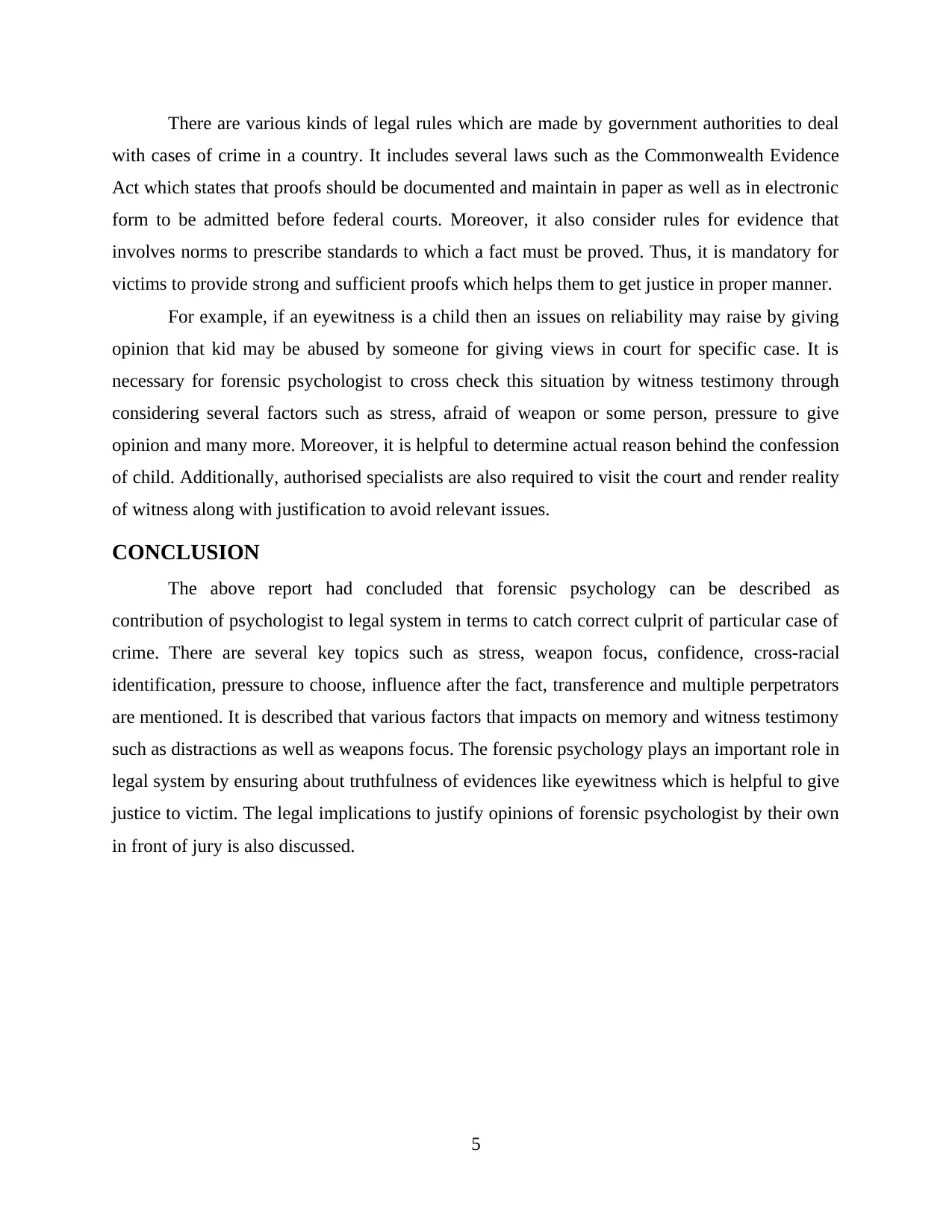
There are various kinds of legal rules which are made by government authorities to deal
with cases of crime in a country. It includes several laws such as the Commonwealth Evidence
Act which states that proofs should be documented and maintain in paper as well as in electronic
form to be admitted before federal courts. Moreover, it also consider rules for evidence that
involves norms to prescribe standards to which a fact must be proved. Thus, it is mandatory for
victims to provide strong and sufficient proofs which helps them to get justice in proper manner.
For example, if an eyewitness is a child then an issues on reliability may raise by giving
opinion that kid may be abused by someone for giving views in court for specific case. It is
necessary for forensic psychologist to cross check this situation by witness testimony through
considering several factors such as stress, afraid of weapon or some person, pressure to give
opinion and many more. Moreover, it is helpful to determine actual reason behind the confession
of child. Additionally, authorised specialists are also required to visit the court and render reality
of witness along with justification to avoid relevant issues.
CONCLUSION
The above report had concluded that forensic psychology can be described as
contribution of psychologist to legal system in terms to catch correct culprit of particular case of
crime. There are several key topics such as stress, weapon focus, confidence, cross-racial
identification, pressure to choose, influence after the fact, transference and multiple perpetrators
are mentioned. It is described that various factors that impacts on memory and witness testimony
such as distractions as well as weapons focus. The forensic psychology plays an important role in
legal system by ensuring about truthfulness of evidences like eyewitness which is helpful to give
justice to victim. The legal implications to justify opinions of forensic psychologist by their own
in front of jury is also discussed.
5
with cases of crime in a country. It includes several laws such as the Commonwealth Evidence
Act which states that proofs should be documented and maintain in paper as well as in electronic
form to be admitted before federal courts. Moreover, it also consider rules for evidence that
involves norms to prescribe standards to which a fact must be proved. Thus, it is mandatory for
victims to provide strong and sufficient proofs which helps them to get justice in proper manner.
For example, if an eyewitness is a child then an issues on reliability may raise by giving
opinion that kid may be abused by someone for giving views in court for specific case. It is
necessary for forensic psychologist to cross check this situation by witness testimony through
considering several factors such as stress, afraid of weapon or some person, pressure to give
opinion and many more. Moreover, it is helpful to determine actual reason behind the confession
of child. Additionally, authorised specialists are also required to visit the court and render reality
of witness along with justification to avoid relevant issues.
CONCLUSION
The above report had concluded that forensic psychology can be described as
contribution of psychologist to legal system in terms to catch correct culprit of particular case of
crime. There are several key topics such as stress, weapon focus, confidence, cross-racial
identification, pressure to choose, influence after the fact, transference and multiple perpetrators
are mentioned. It is described that various factors that impacts on memory and witness testimony
such as distractions as well as weapons focus. The forensic psychology plays an important role in
legal system by ensuring about truthfulness of evidences like eyewitness which is helpful to give
justice to victim. The legal implications to justify opinions of forensic psychologist by their own
in front of jury is also discussed.
5
Paraphrase This Document
Need a fresh take? Get an instant paraphrase of this document with our AI Paraphraser
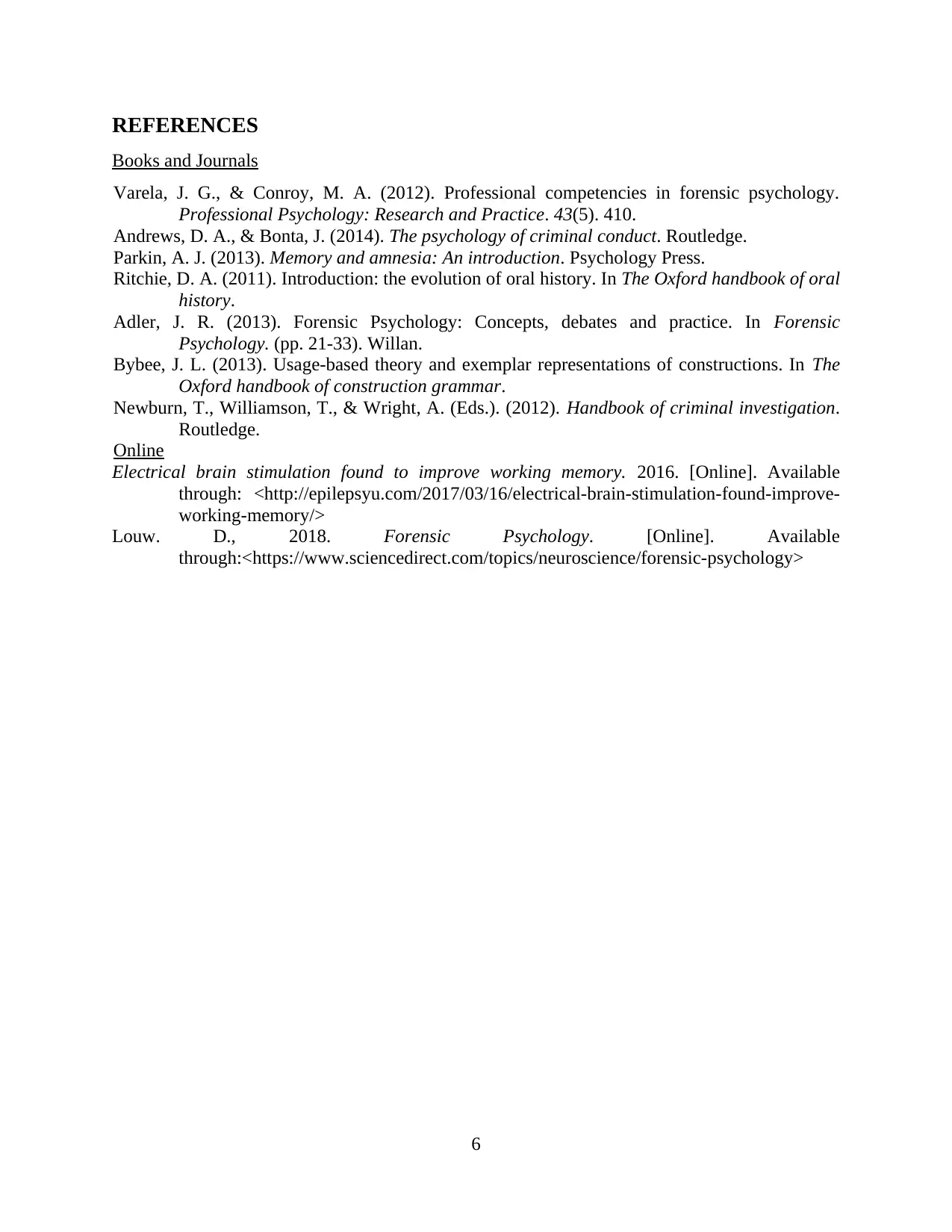
REFERENCES
Books and Journals
Varela, J. G., & Conroy, M. A. (2012). Professional competencies in forensic psychology.
Professional Psychology: Research and Practice. 43(5). 410.
Andrews, D. A., & Bonta, J. (2014). The psychology of criminal conduct. Routledge.
Parkin, A. J. (2013). Memory and amnesia: An introduction. Psychology Press.
Ritchie, D. A. (2011). Introduction: the evolution of oral history. In The Oxford handbook of oral
history.
Adler, J. R. (2013). Forensic Psychology: Concepts, debates and practice. In Forensic
Psychology. (pp. 21-33). Willan.
Bybee, J. L. (2013). Usage-based theory and exemplar representations of constructions. In The
Oxford handbook of construction grammar.
Newburn, T., Williamson, T., & Wright, A. (Eds.). (2012). Handbook of criminal investigation.
Routledge.
Online
Electrical brain stimulation found to improve working memory. 2016. [Online]. Available
through: <http://epilepsyu.com/2017/03/16/electrical-brain-stimulation-found-improve-
working-memory/>
Louw. D., 2018. Forensic Psychology. [Online]. Available
through:<https://www.sciencedirect.com/topics/neuroscience/forensic-psychology>
6
Books and Journals
Varela, J. G., & Conroy, M. A. (2012). Professional competencies in forensic psychology.
Professional Psychology: Research and Practice. 43(5). 410.
Andrews, D. A., & Bonta, J. (2014). The psychology of criminal conduct. Routledge.
Parkin, A. J. (2013). Memory and amnesia: An introduction. Psychology Press.
Ritchie, D. A. (2011). Introduction: the evolution of oral history. In The Oxford handbook of oral
history.
Adler, J. R. (2013). Forensic Psychology: Concepts, debates and practice. In Forensic
Psychology. (pp. 21-33). Willan.
Bybee, J. L. (2013). Usage-based theory and exemplar representations of constructions. In The
Oxford handbook of construction grammar.
Newburn, T., Williamson, T., & Wright, A. (Eds.). (2012). Handbook of criminal investigation.
Routledge.
Online
Electrical brain stimulation found to improve working memory. 2016. [Online]. Available
through: <http://epilepsyu.com/2017/03/16/electrical-brain-stimulation-found-improve-
working-memory/>
Louw. D., 2018. Forensic Psychology. [Online]. Available
through:<https://www.sciencedirect.com/topics/neuroscience/forensic-psychology>
6
1 out of 8
Related Documents
Your All-in-One AI-Powered Toolkit for Academic Success.
+13062052269
info@desklib.com
Available 24*7 on WhatsApp / Email
![[object Object]](/_next/static/media/star-bottom.7253800d.svg)
Unlock your academic potential
Copyright © 2020–2026 A2Z Services. All Rights Reserved. Developed and managed by ZUCOL.




